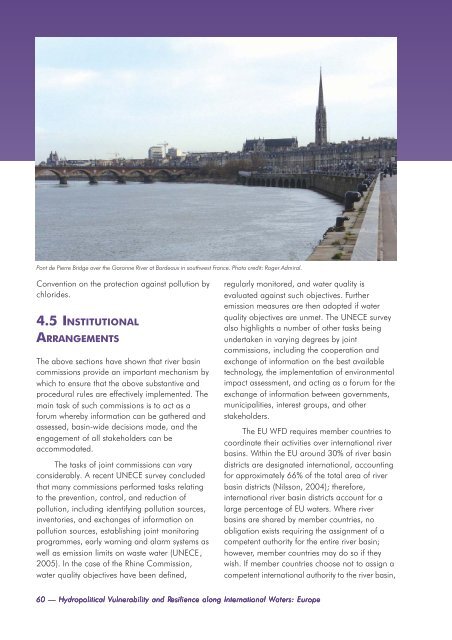Europe - UNEP
Europe - UNEP
Europe - UNEP
Create successful ePaper yourself
Turn your PDF publications into a flip-book with our unique Google optimized e-Paper software.
Pont de Pierre Bridge over the Garonne River at Bordeaux in southwest France. Photo credit: Roger Admiral.<br />
Convention on the protection against pollution by<br />
chlorides.<br />
4.5 INSTITUTIONAL<br />
ARRANGEMENTS<br />
The above sections have shown that river basin<br />
commissions provide an important mechanism by<br />
which to ensure that the above substantive and<br />
procedural rules are effectively implemented. The<br />
main task of such commissions is to act as a<br />
forum whereby information can be gathered and<br />
assessed, basin-wide decisions made, and the<br />
engagement of all stakeholders can be<br />
accommodated.<br />
The tasks of joint commissions can vary<br />
considerably. A recent UNECE survey concluded<br />
that many commissions performed tasks relating<br />
to the prevention, control, and reduction of<br />
pollution, including identifying pollution sources,<br />
inventories, and exchanges of information on<br />
pollution sources, establishing joint monitoring<br />
programmes, early warning and alarm systems as<br />
well as emission limits on waste water (UNECE,<br />
2005). In the case of the Rhine Commission,<br />
water quality objectives have been defined,<br />
regularly monitored, and water quality is<br />
evaluated against such objectives. Further<br />
emission measures are then adopted if water<br />
quality objectives are unmet. The UNECE survey<br />
also highlights a number of other tasks being<br />
undertaken in varying degrees by joint<br />
commissions, including the cooperation and<br />
exchange of information on the best available<br />
technology, the implementation of environmental<br />
impact assessment, and acting as a forum for the<br />
exchange of information between governments,<br />
municipalities, interest groups, and other<br />
stakeholders.<br />
The EU WFD requires member countries to<br />
coordinate their activities over international river<br />
basins. Within the EU around 30% of river basin<br />
districts are designated international, accounting<br />
for approximately 66% of the total area of river<br />
basin districts (Nilsson, 2004); therefore,<br />
international river basin districts account for a<br />
large percentage of EU waters. Where river<br />
basins are shared by member countries, no<br />
obligation exists requiring the assignment of a<br />
competent authority for the entire river basin;<br />
however, member countries may do so if they<br />
wish. If member countries choose not to assign a<br />
competent international authority to the river basin,<br />
60 — Hydropolitical Vulnerability and Resilience along International Waters: <strong>Europe</strong>
















